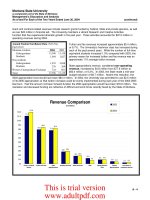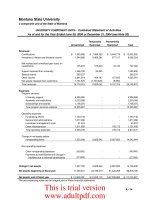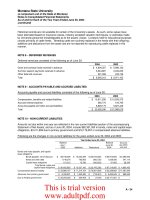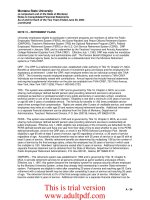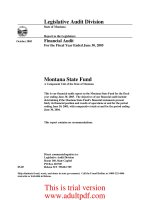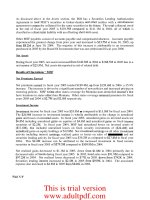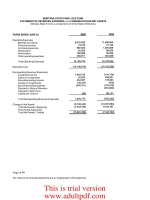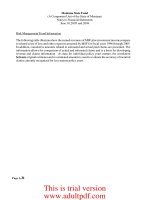Legislative Audit Division State of Montana Report to the Legislature October 2005 Financial_part3 potx
Bạn đang xem bản rút gọn của tài liệu. Xem và tải ngay bản đầy đủ của tài liệu tại đây (162.97 KB, 10 trang )
MONTANA STATE FUND
-
OLD FUND
STATEMENT OF REVENUES, EXPENSES,
and
CHANGES IN FUND NET ASSETS
Montana State Fund is a component unit of the State of Montana
YEARS ENDED JUNE
30,
Operating Expenses
Benefits and claims
Personal services
Contractual services
Depreciation
Amortization
Other operating expenses
Total Operating Expenses
Operating Loss
Nonoperating Revenue (Expenses)
Investment income
Gains on investments
Securities lending income
Losses on investments
Securities lending expense
Payment to State of Montana
Payment to New Fund
Liability tax revenue
Total Nonoperating Revenue (Expenses)
Change in Net Assets
Total Net Assets
-
Beginning
Prior Period Adjustment
Total Net Assets
-
Ending
Page
A116
The notes to the financial statements are an integral part of this statement.
This is trial version
www.adultpdf.com
MONTANA STATE FUND
-
OLD FUND
STATEMENT OF CASH FLOWS
Montana State Fund
is
a component unit of the State of Montana
YEARS ENDED JUNE
30.
CASH FLOWS FROM OPERATING ACTIVITIES
Payments to suppliers for goods and
services
Payments to employees
Cash payments for claims
Collection of payroll taxes
Net Cash Used for Operating Activities
CASH FLOWS FROM
NONCAPITAL FINANCIAL ACTIVITIES
Payment to State of Montana
Payment to New Fund
Net Cash Used for
Noncapital Financing Activities
CASH FLOWS FROM INVESTING ACTIVITIES
Purchase of investments
Proceeds from sales or maturities of investments
Proceeds from securities lending transactions
Payments of security lending costs
Interest and dividends on investments
Net Cash Provided by Investing Activities
NET DECREASE IN CASH AND CASH EQUIVALENTS
CASH AND CASH EQUIVALENTS
-
JULY
1
CASH AND CASH EQUIVALENTS
-
JUNE
30
The notes to the financial statements are an integral part of this statement.
pp
Page
A
-
17
This is trial version
www.adultpdf.com
YEARS ENDED JUNE
30,
MONTANA STATE FUND
-
OLD FUND
STATEMENT OF CASH FLOWS
Montana State Fund
is
a component unit of the State of Montana
RECONCILIATION OF CHANGE IN NET ASSETS TO
NET CASH USED FOR OPERATING
ACTIVITIES
Change in Net Assets (8,138,444)
Adjustments to Reconcile Change in Net Assets to Net
Cash Used for Operating Activities
Security lending costs
Security lending income
Interest on investment
Payment to State of Montana
Payment to New Fund
Prior period adjustment for payroll taxes
Decrease (increase) in
Accounts receivable
Due from primary government
Increase (decrease) in
Accounts payable
Due to component units
Deferred revenue
Estimated claims
Total adjustments
Net Cash Used for Operating Activities
Page
14-18
The notes to the financial statements are an integral part of this statement.
This is trial version
www.adultpdf.com
Montana State Fund
(A Component Unit of the State of Montana)
Notes to Financial Statements
June 30,2005 and 2004
1.
Summary of Significant Accounting Policies
Description of Business
The Montana State Fund (MSF) is a nonprofit, quasi
-
public entity established under Title 39, chapter
71 of the Montana Code Annotated (MCA). MSF provides Montana employers with an option for
workers' compensation and occupational disease insurance and guarantees available coverage for all
employers in Montana. MSF is governed by a seven member Board of Directors appointed by the
Governor. MSF is attached to the State of Montana, Department of Administration for
administrative purposes only.
During the 1990 Montana Special Legislative Session, legislation passed establishing separate
funding and accounts for claims of injuries resulting from accidents occurring before July 1, 1990,
referred to as the Old Fund, and claims occurring on or after July 1, 1990, referred to as MSF.
Hereafter, any reference to MSF refers to the New Fund or those claims occurring after July 1,1990.
MSF functions as an autonomous insurance entity supported solely from its own revenues. All
assets, debts, and obligations of MSF are separate and distinct from assets, debts, and obligations of
the State of Montana. If MSF is dissolved by an act of law, the money in MSF is subject to the
disposition provided by the legislature enacting the dissolution with due regard given to obligations
incurred and existing (Section 39
-
71
-
2322, MCA). MSF administers and manages the claims
remaining in the Old Fund for the State of Montana and is the administering entity for recording the
financial activity related to receipt and disbursement of an Old Fund Liability Tax (see Note 4). No
State general fund money is used for MSF operations.
MSF financial statements are presented as a component unit in the State of Montana Comprehensive
Annual Financial Report. The fiscal year 2005 and 2004 financial statements are presented in
conformance with
Governmental Accounting Standards Board Statement 34, which is a comparable
format to the State of Montana Comprehensive Annual Financial Report.
Basis of Accounting
MSF uses the accrual basis of accounting, as defined by generally accepted accounting principles, for
its workers' compensation insurance operations. Under the accrual basis, MSF records revenues in
the accounting period earned, if measurable, and records expenses in the period incurred, if
measurable.
Cash and Cash Equivalents
Cash balances include demand deposits with the State Treasury. Cash equivalents are short
-
term,
highly liquid investments that are both readily convertible to known amounts of cash and so near
-
Page
A
-
19
This is trial version
www.adultpdf.com
Montana State Fund
(A Component Unit of the State of Montana)
Notes to Financial Statements
June 30,2005 and 2004
their maturity that they present insignificant risk of changes in value because of changes in interest
rates. MSF participates in the Montana Board of Investments Short Term Investment Pool (STIP).
STIP balances are highly liquid investments with maturities of 397 days or less with the exception of
securities having rate reset dates. There are no legal risks that the Montana Board of Investments
(BOI) is aware of regarding any STIP investments. The STIP portfolio is carried at amortized cost or
book value with market value approximating cost.
MSF's STIP balance of $29.5M as of June 30,
2005 represents 1.69% of the total STIP. The Old Fund STIP balance of $1 1.6.M as of June 30,2005
represents 0.67% of the total STIP. MSF's STLP
balance of $18.2M as of June 30,2004 represents
1.23%
ofthe total STTP. The Old Fund STIP balance of $3.7M as of June 30,2004 represents 0.25%
of the total STIP.
The STIP investments' credit risk is measured by investment grade ratings given individual
securities. The B01
7
s policy requires that STIP investments have the highest rating in the short
-
term
category by one and/or any Nationally Recognized Statistical Rating Organizations (NRSRO). The
four
NRSR07s include Standard and Poor's, Moody's Investors Service, Fitch, Inc. and Dominion
Bond Rating Service Ltd.
Asset
-
backed securities constitute 71.72% of the BO17s total STIP portfolio as of June 30, 2005.
Asset
-
backed securities have less credit risk than do securities not backed by pledged assets. Market
risk for asset
-
backed securities is the same as market risk for similar non asset
-
backed securities.
Asset
-
backed securities constitute 63.58% of the Board of lnvestmei~t's total
STIP
portfolio as of
June 30,2004.
Variable rate (floating rate) securities make up 24.16% of the
BOI's total STIP portfolio as of ~une
30,2005. Variable rate securities make lip 34.12% oftl~e BOl's total STIP portfolio as of June 30,
2004. While variable rate securities have credit risk identical to similar fixed rate securities, their
market risk (income) is more sensitive to interest rate changes. However, the market risk
(valuelprice) may be less volatile than fixed rate securities because their value will usuallyremain at
or near par as a result of their interest rates being periodically reset to maintain a current market
yield.
Investments
In addition to STIP investments, MSF invests in long
-
term securities with the BOI. Under the
provisions of the state constitution, MSF
7
s invested assets are managed by the BOI. Securities are
stated at fair value as defined and required by Governmental Accounting Standards Board (GASB)
Statement Number 31,
"
Accounting and Financial Reporting for Certain Investments and for
External Investment Pools
"
. Premiums and discounts are amortized using the straight
-
line method
over the life of the securities. Net unrealized gains or losses on securities are included in net income
in accordance with GASB 3 1.
Page
A
-
20
This is trial version
www.adultpdf.com
Montana State Fund
(A Component Unit of the State of Montana)
Notes to Financial Statements
June 30,2005 and 2004
Effective June 30,2005, the BOI implemented the provisions of Governmental Accounting
Standards Board (GASB) Statement No. 40
"
Deposit and Investment Risk Disclosures
"
. The
financial statement disclosures for the year ended June 30,2004 have been restated to compare
with the financial statement disclosures for the year ended June 30,2005. The investment risk
disclosures are described in the following paragraphs.
Credit Risk
Credit risk is defined as the risk that an issuer or other counterparty to an investment will not
fulfill its obligation. With the exception of the U.S. government securities, the All Other Fund
(AOF) fixed income instruments have credit risk as measured by major credit rating services.
This risk is that the issuer of a fixed income security may default in making timely principal and
interest payments. The Board of Investment's policy requires New Fund and Old Fund fixed
income investments, at the time of purchase, to be rated an investment grade as defined by
Moody's
andfor Standard
&
Poor's (S&P) rating services. The U.S. government securities are
guaranteed directly or indirectly by the U.S. govemment. Obligations of the U.S. government or
obligations explicitly guaranteed by the U.S. government are not considered to have credit risk
and do not require disclosure of credit quality. The credit ratings presented in the following table
are provided by
S& P's rating services. If anS!kP rating is not available, a Moody's rating has
been used.
Custodial Credit Risk
Custodial credit risk for investments is the risk that, in the event of the failure of the counterparty
to a transaction, a government will not be able to recover the value of the investment or collateral
securities that are in the possession of an outside party. As of June 30,2005 and 2004, all the
fixed income and other equity securities were registered in the nominee name for the Montana
Board of Investments and held in the possession of the Board's custodial bank, State Street Bank.
The Equity Index investment and State Street Bank repurchase agreement were purchased in the
State of Montana Board of Investments name.
Concentration of Credit Risk
Concentration of credit risk is the risk of loss attributed to the magnitude of a government's
investment in a single issuer. The New Fund Investment Policy, requires credit risk to be limited
to 3 percent in any one name except
AAA
rated issues will be limited to
6%
while the Old Fund
investment policy statement does not address concentration of credit risk. The New Fund
Investment Policy provides for
"
no limitation on U.S. government/agency securities
"
.
Investments issued or explicitly guaranteed by the U.S. govemment are excluded
from the
concentration of credit risk requirement.
-
Page
A
-
2
1
This is trial version
www.adultpdf.com
Montana State
Fund
(A Component Unit of the State of Montana)
Notes to Financial Statements
June 30,2005 and 2004
For fiscal year 2005, New Fund had concentration of credit risk exposure to the Federal Home
Loan Mortgage Corp of 5.43% and Federal National Mortgage Association of 11.75%. For fiscal
year 2004, New Fund only had concentration of credit risk exposure of 10.74% to the Federal
National Mortgage Association.
For fiscal year 2005, Old Fund had concentration of credit risk exposure to the Federal Home
Loan Mortgage Corp of 7.89% and Federal
National Mortgage Association of 24.78%. For fiscal
year 2004, New Fund had concentration of credit risk exposure to the Federal National Mortgage
Association of 21.96% and JP Morgan Chase Commercial Mortgage of 6.56%.
Interest Rate Risk
Interest rate risk is the risk that changes in interest rates will adversely affect the fair value of an
investment. The New Fund and Old Fund investment policies do not
formally address interest
rate risk. In accordance with GASB Statement No. 40, the Board has selected the effective
duration method to disclose interest rate risk. This method, as provided by our custodial bank, is
"
An
option
-
adjusted measure of a bond's (or portfolio's) sensitivity to changes in interest rates.
Duration is calculated as the average percentage change in a bond's value (price plus accrued
interest) under
shifts of the Treasury curve plus/minus 100 basis points. The effective duration
method incorporates the effect of the embedded options for bonds and changes in prepayments
for mortgage
-
backed securities (including pass
-
throughs, Collateralized Mortgage Obligations
(CMO's) and Adjustable Rate Mortgages (ARM'S))."
As of June 30,2005, the New Fund and Old Fund portfolios did not hold any structured financial
instruments known as REMICs (Real Estate Mortgage Investment Conduits). REMICs are
pass-
through vehicles for multiclass mortgage
-
backed securities. Strip investments represent the
separate purchase of the principal and interest cash flows of a mortgage security. As of June 30,
2004, the New Fund and the Old Fund portfolios held a REMIC with an amortized cost of
$8,658,861 and $4,329,430, respectively, as reported in the U.S. government mortgage
-
backed
category. This security paid off in March 2005. The REMIC securities are based on separate or
combined cash flows
from principal and interest payments on underlying mortgages. When
underlying mortgages are prepaid, the interest cash flows are reduced while principal cash flows
are increased. If homeowners pay on mortgages longer than anticipated, the cash flow effect
would be the opposite.
Corporate asset
-
backed securities are based on cash flows from principal and interest payments
on underlying auto loan receivables, credit card receivables, and other assets. These securities,
while sensitive to prepayments due to interest rate changes, have less credit risk than securities
not backed by pledged assets.
New Fund and Old Fund investments are categorized below to disclose credit and interest rate
Page
A
-
22
This is trial version
www.adultpdf.com
Montana State Fund
(A
Component Unit of the State of Montana)
Notes to Financial Statements
June
30,2005
and
2004
risk as of June
30,2005
and June
30,2004.
Credit risk reflects the bond quality rating, by
investment type, as of the June
30
report date. If a bond investment type is unrated, the quality
type is indicated by
NR
(not rated). Interest rate risk is disclosed using effective duration. Both
the credit quality ratings and duration have been calculated excluding cash equivalents.
Credit Quality Rating and Effective Duration as of June
30,2005
Securitv Investment Tvve
Corporate Bonds (Rated)
U.S. Govt Direct
-
Backed
U.S. Govt Indirect
-
Backed
State Street Repo* (Rated)
STIP (Unrated)
Total Fixed Income Investments
Direct Investments
Equity Index Fund
Credit
Quality Effective
Fair Value Rating Duration
$
299,185,736
A
4.84
17,805,771
AAA
7.45
259,195,259
AAA
3.67
3,105,156
AA
-
NA
29,462,578
NR NA
608,754,500
Total Investments
$
685.491.597
88=
&B
Securities Lending Collateral Investment Pool .
$
101,859,456
NR NA
*
At June
30,2005,
the State Street Bank repurchase agreement was collateralized at
$3,182,153
a Federal
Home Loan Mortgage Corporation note maturing February
15,2006.
Credit Quality Rating and Effective Duration as of June
30,2004
Securitv Investment Tyve
Corporate Bonds (Rated)
U.S. Govt Direct
-
Backed
U.S. Govt Indirect
-
Backed
STIP (Unrated)
Total Fixed Income Investments
Direct Investments
Equity Index Fund
Total Investments
Credit
Quality Effective
Fair Value Rating Duration
$
281,014,259
A
4.57
33,858,050
AAA
4.48
195,056,940
AAA
4.78
18,207,649
NR NA
528,136,898
Securities Lending Collateral Investment Pool
$
141,060,425
NR NA
Page
A
-
23
This is trial version
www.adultpdf.com
Montana State Fund
(A Component Unit of the State of Montana)
Notes to Financial Statements
June 30,2005 and 2004
Old Fund Credit Quality Rating and Effective Duration as of June
30,2005
Credit
Q-Y
Effective
Securitv Investment
Tvpe Fair Value Rating Duration
Corporate Bonds (Rated)
U.S. Govt Direct
-
Backed
U.S. Govt Indirect
-
Backed
State Street Repo (Rated)*
STIP (Unrated)
$
8,174,889
BBB+ 0.96
15,927,393
AAA
2.04
26,216,154
AAA
1.56
1,035,052
AA
-
NA
11,599,288
NR
-
NA
Total Investments
$
62.952.776
A&
L~!iz
Securities Lending Collateral Investment Pool
$
17,768,750
NR NA
*
At June
30,2005,
the State Street Bank repurchase agreement was collateralized at
$1,060,718
by a
Federal Home Loan Mortgage Corporation note maturing February
15,2006.
Old Fund Credit Quality Rating and Effective Duration as of June
30,2004
Securitv Investment Tvpe
Corporate Bonds (Rated)
U.S. Govt Direct
-
Backed
U.S. Govt Indirect
-
Backed
STIP (Unrated)
Credit
Quality Effective
Fair Value Rating Duration
$
18,925,865
A+ 1.82
28,653,821
AAA
4.29
21,635,908
AAA
2.37
3,682,851
NR
NA
-
Total Investments
$
72.898.445
BBf.
&a2
Securities Lending Collateral Investment Pool
$13.248.863
NR NA
MSF investments are classified in risk Category
1
or as Not Categorized under State of Montana
standards. Risk category 1 includes investments that are insured or registered, or securities held by
the BOI or its agent in the
BO17s name. Not Categorized includes investments held by broker-
dealers under securities loans with cash collateral.
Under the provisions of state statutes, the BOI has, by a Securities Lending Authorization
Agreement, authorized the custodial bank, State Street Bank (SSB), to lend the
BO17s securities to
broker
-
dealers and other entities with a simultaneous agreement to return the collateral for the same
-
-
-
Page
A
-
24
This is trial version
www.adultpdf.com
Montana State Fund
(A Component Unit of the State of Montana)
Notes to Financial Statements
June 30,2005 and 2004
securities in the future. During the period the securities are on loan, the BOI receives
a
fee and the
custodial bank must initially receive collateral equal to 102% of the fair value of the securities on
loan and must maintain collateral equal to but not less than 100% of the fair value of the loaned
security. The BOI retains all rights and risks of ownership during the loan period.
The cash collateral received on each loan was invested, together with the cash collateral of other
qualified plan lenders, in a collective investment pool, the Securities Lending Quality trust. The
relationship between the average maturities of the investment pool and the
BOI's loans was affected
by the maturities of the loans made by other plan entities that invested cash collateral in the
collective investment pool, which the BOI could not determine. On June 30, 2005 and
June 30,
2004, the BOI had no credit risk exposure to borrowers.
The following table
presei~ts the carrying and market values of tllc securities on loan and the total
cash collateral held for fiscal years ended June 30,2005 and June 30,2004
for both
MSF
and the Old
Fund:
-
-
-
-
-
-
-
/~otal Collateral
-
Held
-
$1
4
1
-
-
As of June 30, 2005, MSF and the Old Fwd investments illclude
$1
15.2M and $17.2M
respectively, in long-tenn securities on loan that eaned interest income d~uing the fiscal year of
$2.4M and S455K respectively.
As of June 30, 2004, MSF and the Old Fund
investments include $134.8M and $14.1M
respectively, in long
-
term securities on loan that earned interest income during the fiscal year of
$939K and $1
19K
respectively.
In November
2000, the Montana Constitution was amended to allow investing
in
equity securities,
with the
restrictioil that equity securities cannot exceed 25% of total iilvestinent book value.
However, in May
2003, the BOI approved a policy statement to keep equities in the
8%
to
12%
range. As of June 30,2005, equity securities in MSF include $68.4M at book value, enhanced by
$8.3M in market value appreciation. As of June 30, 2004, equity securities in MSF include
Page Z25
This is trial version
www.adultpdf.com

